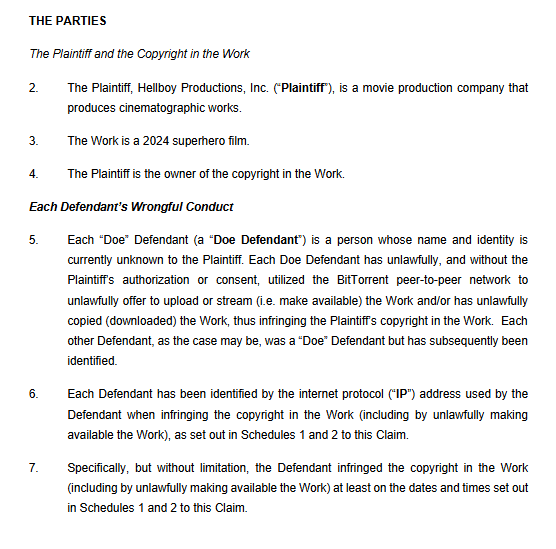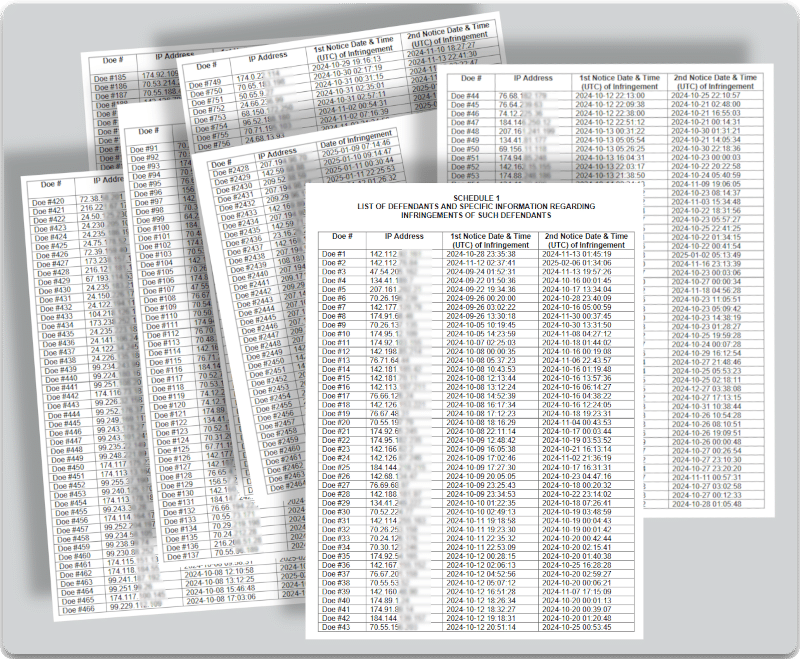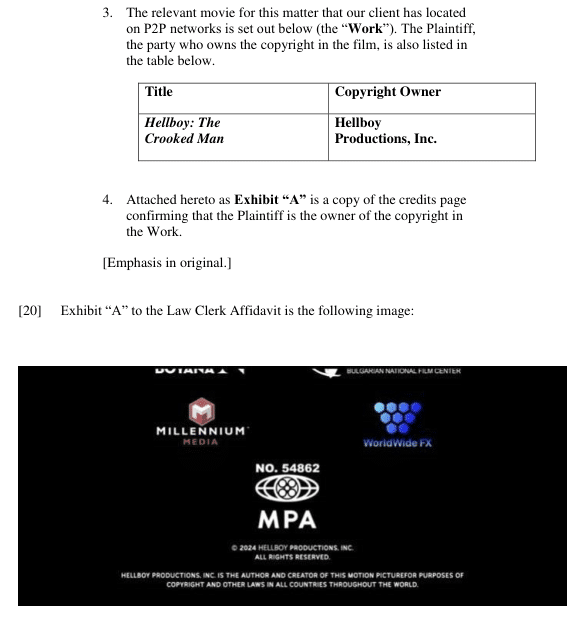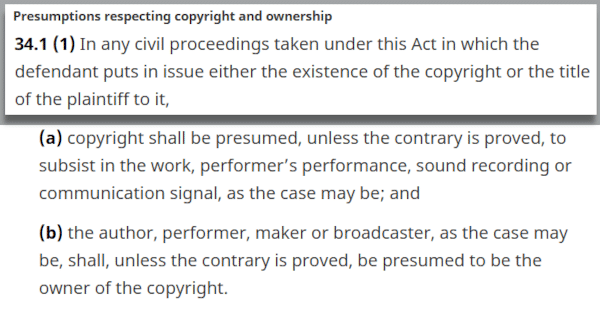 Filing lawsuits against internet users who allegedly shared copyrighted content online without permission, has led to countless cash settlements over the years and for some, a lucrative business model in its own right.
Filing lawsuits against internet users who allegedly shared copyrighted content online without permission, has led to countless cash settlements over the years and for some, a lucrative business model in its own right.
There’s also no shortage of cases going wrong for all kinds of reasons . A recent case in Canada, seeking “extraordinary equitable relief” upon which cases like this either live or die, collapsed in dramatic fashion at the very first hurdle, and went further downhill from there.
Background to a Familiar Claim
Hellboy Productions, Inc. filed its statement of claim at Federal Court in Toronto on March 4, 2025. The basis for the claim was very familiar, having made hundreds of appearances in cases previously filed at courts in Canada, the United States, United Kingdom, Scandinavia, and beyond.

The movie in question, Hellboy: The Crooked Man, fits the profile for an appearance in a settlement lawsuit. Hellboy movies have never performed well at the box office and after generating just $1.4m worldwide, the latest outing continued the trend.
While many fans of the Hellboy brand still wanted to watch The Crooked Man, average reviews of 4.5/10 most likely dampened enthusiasm for paying to do so. That can lead to activity on pirate sites for as long as it lasts and in this instance, long enough for the copyright holder to capture ~2,400 IP addresses linked to three Canadian ISPs – Telus, Cogeco, and Bell.
Turning IP Addresses into Names and Physical Addresses
In common with the UK, Ireland, and Australia, unmasking alleged pirates in Canada typically requires the plaintiffs to obtain a Norwich Pharmacal order, or simply Norwich order for short. Obtained from a court, Norwich orders compel a third party, who for various reasons have become unwittingly involved in someone else’s wrongdoing, to disclose information (usually documents/records) that can help a plaintiff identify an alleged infringer.
In this case, the claimant (Hellboy Productions, Inc.) alleges that infringers used internet connections provided by Telus, Cogeco, and Bell to pirate the movie. If served with a Norwich order, the ISPs would be required to match the IP addresses and timestamps provided by the plaintiffs, to activity logs that identify the corresponding account holders.

Once in the hands of the movie company, this information triggers a process to contact as many account holders as possible, on the assumption that they (or someone close) are infringers, and therefore liable to pay compensation for any damages caused. The amount tends to vary but whether the demand was CAD 1,000 or more, the potential revenue from 2,400 subscribers would easily exceed worldwide box office sales.
At least, if all went to plan.
Does the Claimant Have a Bona Fide Claim?
In an order and reasons issued last week, Case Management Judge John C. Cotter notes that Telus did not oppose the order requested by the movie company, while the positions of Cogeco and Bell are simply unknown. The absence of ISPs doesn’t mean that a claimant automatically wins, however.
“A lack of opposition from an ISP is not sufficient on its own to grant the motion. The Court must be satisfied that the applicable test has been met. This is important given the privacy interests of the unidentified alleged wrongdoers,” Judge Cotter explains.
Before those interests are weighed against those of the rightsholder, the plaintiff must show that it has a bone fide claim for copyright infringement and can show, on balance, that the alleged infringers used the ISPs’ services to infringe its rights.
According to the Judge, the plaintiffs failed to produce sufficient evidence to show either.
Insufficient Grounds for Asserting Copyright Ownership
“An analysis of the merits of the claim in this case includes some minimal analysis of whether copyright subsists in the Work, and whether the plaintiff has standing to assert a claim for copyright infringement. In the context of this case, the issue of standing is whether plaintiff is the owner of the copyright in the Work, which is asserted in paragraph 4 of the statement of claim,” Judge Cotter writes. (see screenshot above)
“The plaintiff’s evidence did not include a certificate of copyright registration. The plaintiff’s evidence on copyright subsistence and ownership is limited to the following in the Law Clerk Affidavit (which is the same for each of the three motions):”

Showing the company name in the credits above means that the plaintiff relied on presumptions available under Section 34.1 of the Copyright Act that a) copyright subsists in the work and b) since its name appears in the credits as the maker of the movie, it should be presumed that the plaintiff is indeed the maker.
According to Judge Cotter, those presumptions do not apply when the plaintiff has requested a Norwich order. Section 34.1(1) sets out a precondition for the engagement of the presumptions.

In this matter, the 2,400+ plus defendants are currently anonymous and without knowing who they are, it’s impossible to show that a defendant had “put the existence or title of the copyright in issue.”
Unable to trigger the precondition, no reliance could be placed on the presumptions available under Section 34.1. The Judge dismissed the evidence shown in the Law Clerk Affidavit as “at best, hearsay evidence for which the source is not specified,” and with no copyright certificate there was no way to prove ownership. Moreover, there was no evidence to show that copyright subsists in the movie.
With no bona fide copyright claim, the Judge dismissed all three motions for Norwich orders. He then addressed a few additional issues in need of an airing.
Evidence Should Be Organized, Easily Understood, Easy to Verify
In his order and reasons, Judge Cotter emphasizes that the Court is entitled to demand the “best available evidence” when granting the “extraordinary equitable relief of a Norwich order.”
While failure to establish copyright ownership proved fatal for all three motions, the image of the movie credits page also fell short of the expected standard. The Judge also criticized evidence presented in the affidavit of Thomas Nowak, the CEO of anti-piracy/BitTorrent monitoring company Maverickeye UG, the supplier of evidence in this case and scores of others in the past.
Showing that Telus, Cogeco, or Bell is the ISP for the alleged infringers was a requirement to obtain a Norwich order. Deficiencies in the example below and a series of issues detailed on pages 17-21 of Judge Cotter’s order, led to the conclusion that the plaintiff had failed to show that, while also failing to meet the evidence standard expected by the Court.

Deficiencies in the example above and a series of others detailed elsewhere, plus the failure to show ownership of the copyright it aimed to enforce, meant the plaintiff’s requests for Norwich orders were denied. As a result, the anonymous alleged infringers remain anonymous, but for how long is unknown.
Despite significant criticism, dismissal of the plaintiff’s motions, and denial of its request for an award of costs, Judge Cotter notes that his order does not preclude further motions by the plaintiff.
As sure as day follows night, those motions will arrive, only the timing is in doubt.
The original claim can be found here (pdf), Judge Cotter’s order is available here (pdf)
From: TF, for the latest news on copyright battles, piracy and more.
Powered by WPeMatico
